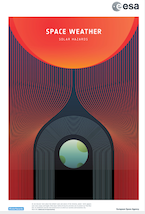Speaker
Description
The Sweeping Langmuir Probe (SLP) instrument, which will fly on board the Pico-Satellite for Atmospheric and Space Science Observations (PICASSO), has been developed at the Royal Belgian Institute for Space Aeronomy. PICASSO, an ESA in-orbit demonstrator which will be launched end of 2019 / beginning of 2020 with Vega, is a triple unit CubeSat of dimensions 340.5x100x100 mm.
SLP is a four-channel Langmuir probe instrument with four independent cylindrical probes. By sweeping the potential of a probe with respect to the plasma potential while measuring the current from this probe, the instrument will acquire a current-voltage characteristic from which the electron density and temperature, ion density and S/C (spacecraft) potential are retrieved. It is designed to measure the plasma parameters at an altitude around 500 km from a high inclination orbit. It can measure plasma density over a wide range, from 1e8/m³ up to 1e13/m³ and the electron temperature from 500 K and 10.000 K.
An important issue implied by the use of a nano-satellite platform for a Langmuir probe instrument is the limited conducting area of the spacecraft, which leads to spacecraft charging and drift of the instrument’s electrical ground during the measurement. A specific measurement technique that includes the simultaneous measurement of the potential and current of different probes has been developed to retrieve consistent current-voltage characteristics that can be used to estimate the plasma parameters mentioned above. This technique has been tested in a plasma chamber at ESTEC with a satellite mock-up which is electrically representative of PICASSO.

